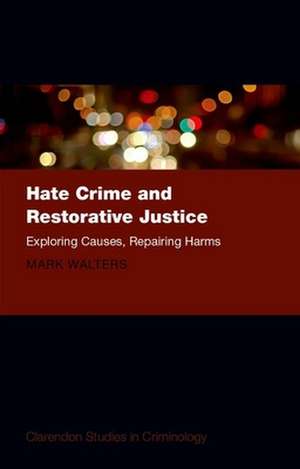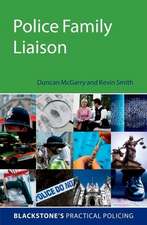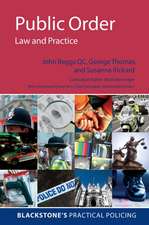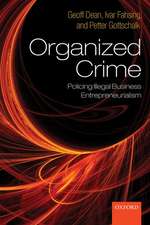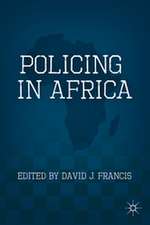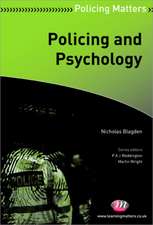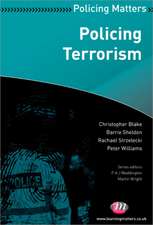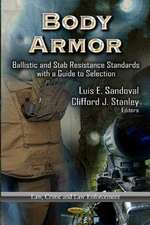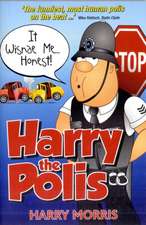Hate Crime and Restorative Justice: Exploring Causes, Repairing Harms: Clarendon Studies in Criminology
Autor Mark Austin Waltersen Limba Engleză Hardback – 17 apr 2014
Din seria Clarendon Studies in Criminology
- 30%
 Preț: 524.09 lei
Preț: 524.09 lei - 27%
 Preț: 539.54 lei
Preț: 539.54 lei - 30%
 Preț: 596.91 lei
Preț: 596.91 lei - 30%
 Preț: 538.18 lei
Preț: 538.18 lei - 30%
 Preț: 539.66 lei
Preț: 539.66 lei - 31%
 Preț: 517.18 lei
Preț: 517.18 lei - 30%
 Preț: 597.11 lei
Preț: 597.11 lei - 19%
 Preț: 632.93 lei
Preț: 632.93 lei - 30%
 Preț: 537.57 lei
Preț: 537.57 lei - 30%
 Preț: 537.10 lei
Preț: 537.10 lei - 30%
 Preț: 539.15 lei
Preț: 539.15 lei - 19%
 Preț: 525.04 lei
Preț: 525.04 lei - 30%
 Preț: 538.82 lei
Preț: 538.82 lei - 28%
 Preț: 499.64 lei
Preț: 499.64 lei - 19%
 Preț: 660.23 lei
Preț: 660.23 lei - 30%
 Preț: 657.23 lei
Preț: 657.23 lei - 30%
 Preț: 836.16 lei
Preț: 836.16 lei - 27%
 Preț: 657.31 lei
Preț: 657.31 lei - 28%
 Preț: 495.87 lei
Preț: 495.87 lei - 25%
 Preț: 560.76 lei
Preț: 560.76 lei - 28%
 Preț: 423.59 lei
Preț: 423.59 lei - 31%
 Preț: 394.65 lei
Preț: 394.65 lei - 34%
 Preț: 577.53 lei
Preț: 577.53 lei - 14%
 Preț: 196.08 lei
Preț: 196.08 lei - 34%
 Preț: 599.61 lei
Preț: 599.61 lei - 30%
 Preț: 521.30 lei
Preț: 521.30 lei - 19%
 Preț: 338.28 lei
Preț: 338.28 lei - 20%
 Preț: 253.49 lei
Preț: 253.49 lei - 15%
 Preț: 395.89 lei
Preț: 395.89 lei - 34%
 Preț: 573.79 lei
Preț: 573.79 lei - 18%
 Preț: 301.36 lei
Preț: 301.36 lei - 34%
 Preț: 558.18 lei
Preț: 558.18 lei - 32%
 Preț: 465.58 lei
Preț: 465.58 lei - 34%
 Preț: 496.84 lei
Preț: 496.84 lei - 34%
 Preț: 521.19 lei
Preț: 521.19 lei - 30%
 Preț: 502.81 lei
Preț: 502.81 lei - 31%
 Preț: 413.23 lei
Preț: 413.23 lei - 34%
 Preț: 627.66 lei
Preț: 627.66 lei - 19%
 Preț: 566.42 lei
Preț: 566.42 lei - 9%
 Preț: 251.86 lei
Preț: 251.86 lei - 13%
 Preț: 167.29 lei
Preț: 167.29 lei - 31%
 Preț: 485.71 lei
Preț: 485.71 lei - 34%
 Preț: 632.19 lei
Preț: 632.19 lei - 30%
 Preț: 537.40 lei
Preț: 537.40 lei - 10%
 Preț: 270.54 lei
Preț: 270.54 lei - 31%
 Preț: 401.59 lei
Preț: 401.59 lei - 28%
 Preț: 472.66 lei
Preț: 472.66 lei
Preț: 461.95 lei
Preț vechi: 638.49 lei
-28% Nou
Puncte Express: 693
Preț estimativ în valută:
88.42€ • 92.82$ • 73.04£
88.42€ • 92.82$ • 73.04£
Carte tipărită la comandă
Livrare economică 20-25 ianuarie 25
Preluare comenzi: 021 569.72.76
Specificații
ISBN-13: 9780199684496
ISBN-10: 0199684499
Pagini: 348
Dimensiuni: 143 x 222 x 28 mm
Greutate: 0.56 kg
Editura: OUP OXFORD
Colecția OUP Oxford
Seria Clarendon Studies in Criminology
Locul publicării:Oxford, United Kingdom
ISBN-10: 0199684499
Pagini: 348
Dimensiuni: 143 x 222 x 28 mm
Greutate: 0.56 kg
Editura: OUP OXFORD
Colecția OUP Oxford
Seria Clarendon Studies in Criminology
Locul publicării:Oxford, United Kingdom
Recenzii
The book is a must read for anyone with an interest in dialogue based approaches to conflicts with a power element . . . This book presents original findings while combining them with the limited literature on the matter to alert reformists that restorative justice is not easy, and that appropriate training, safeguards and processes must be in place.
This book provides a thought-provoking theoretical basis and empirical justification for a restorative, rather than retributive, response, as well as case histories and practical information, useful to anyone planning a service to tackle this kind of harmful or criminal behaviour.
This book provides a thought-provoking theoretical basis and empirical justification for a restorative, rather than retributive, response, as well as case histories and practical information, useful to anyone planning a service to tackle this kind of harmful or criminal behaviour.
Notă biografică
Dr Mark Austin Walters is a lecturer in law at the University of Sussex where he teaches criminal law and criminology, as well as the Co-Director of the Network for International Hate Studies. He completed his DPhil in law (criminology) at the Centre for Criminology, University of Oxford in 2011 and he also has an MSc in Criminology and Criminal Justice (Research Methods) from the University of Oxford (2008) and an LLM specialising in criminal justice from the University of New South Wales, Sydney, Australia (2006). He has published widely in the field of hate crime, focusing in particular on the criminalisation of hate-motivated offences, the use of restorative justice in hate crime cases, and criminological theories of causation.
